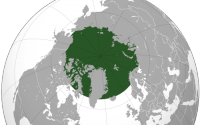Who Owns the North Pole? Debate Heats Up as Climate Change Transforms Arctic

Russia, Denmark and Canada all are trying to prove that their land masses extend to the North Pole, handing the international commission that gives its expert recommendations on such matters its most highly contested issue to date and highlighting the central role the UN Convention on the Law of the Sea will have in determining the future of the rapidly changing region.
Quicktabs: News
As Russia, Denmark and Canada vie to stake their claims, a complicating factor is that a fourth country, the United States, has conducted research on how far the continental shelf extends from Alaska toward the North Pole and could potentially stake its own claim. However, the U.S. cannot submit any of its evidence because it is not a party to the UN Convention on the Law of the Sea (UNCLOS).
Norway, a fifth country that could conceivably have a territorial claim to the North Pole, has said that it will not pursue any claim under UNCLOS.
Russian officials are making repeated statements about the government's intent to claim jurisdiction over the North Pole through a coming submission of evidence to the Commission on the Limits of the Continental Shelf under UNCLOS. The submission will be a continuation of one made to the commission in 2001, which the panel determined insufficient. Russia was directed to resubmit its evidence “within a reasonable time.”
Canada and Denmark likely won't be far behind, claiming in recent submissions to the commission that they each will soon submit evidence that their continental shelves extend to the North Pole.
Canada made a partial submission to the commission on Dec. 9, 2013, on delineating its outer continental shelf in the Atlantic Ocean. It did not include data about the North Pole, but specifically reserved Canada's right to make a submission of such evidence in the future.
Due to the significance placed on obtaining jurisdiction over the North Pole, and given recent violations of the norms of the Law of the Sea Convention, some experts see risks of noncompliance with any recommendations from the commission that would negate a country's submission.
One significant recent violation is Russia's refusal to participate in the dispute-resolution proceeding called by the Netherlands over Russia's arrest of environmental activists who disrupted the activities of a Gazprom drilling platform in the Pechora Sea and seizure of the Dutch-flagged ship Arctic Sunrise last year.
“That's a very clear disrespect for international law. You are a party to the Law of the Sea Convention, and thereby you are bound to the dispute-settlement procedure,” Molenaar said.
Another similar example is China's refusal to participate in a dispute-resolution procedure requested by the Philippines over an area in the South China Sea outside China's exclusive economic zone that China claims for itself.
Such disregard for an international treaty can have broad impacts on various multilateral bodies and negotiation processes and bring about wider distrust and noncompliance.
“The risk is disrespect for agreed multilateral procedures. There is a risk in the background that Russia or even Canada will not act in accordance with the recommendations of the [commission], and this fear I think is more justified because of this nonappearance in the Arctic Sunrise case, and maybe even the recent developments in Ukraine” where Russia is viewed as violating the borders of Ukraine's sovereign territory.
The example of China and Russia's flouting of the convention's norms also presents the possibility that the treaty could be renegotiated to become more favorable to those countries' interests. UNCLOS as currently written is extremely favorable to U.S. interests, codifying the rights of freedom of navigation and passage that are important to maintaining its global power status, according to Titley.
“The real strategic threat for us not being a [party to UNCLOS] is if anybody at some point wants to change the rules of the game … we're not going to have a seat at that table,” Titley said. UNCLOS “basically codifies up a world in which the U.S. is kind of the number one dog. And so now by not ratifying this, as the world changes, and maybe if that situation changes, we're not even going to be in the room when—if this ever gets looked at again. … It's frankly pretty hard to see that another [international legal] regime would be as friendly to U.S. interests as is UNCLOS. That's a real danger.”
Another key risk connected with the United States not being a party to the treaty is that the treaty itself is weakened by lack of U.S. participation, because it is important as a big coastal state and a major economy, according to Jensen.
